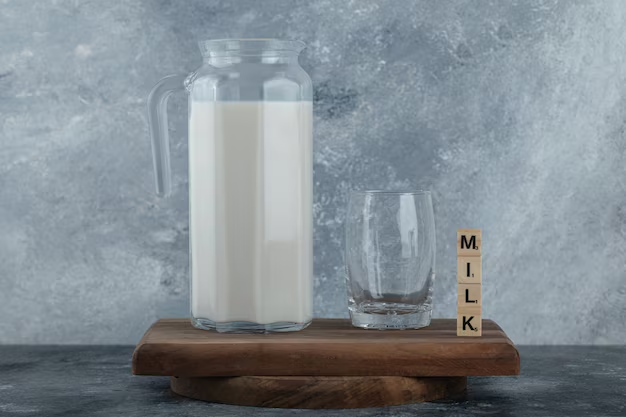Heartburn and acid reflux are common digestive issues that affect millions of people worldwide. These conditions often arise due to excessive stomach acid moving into the esophagus, causing a burning sensation in the chest. Many people believe that drinking milk can alleviate heartburn symptoms. But does milk actually help heartburn? This article will delve into whether milk truly helps with heartburn and acid reflux, analyzing medical evidence and offering practical advice for managing these conditions.
Does Milk Help Heartburn?
Milk has long been considered a natural remedy for heartburn. Its soothing texture and neutral taste make it seem like an ideal choice for relief. But does it truly work?
Why Is Milk Thought to Help Heartburn?
Milk contains calcium and protein, which can temporarily neutralize stomach acid. Many people feel immediate relief after consuming milk because it coats the esophagus and stomach lining. This creates a protective barrier against acidic contents. The belief that milk helps heartburn likely stems from these soothing properties.
What Does Research Say About Milk For Heartburn?
Scientific studies reveal mixed results. Milk can initially neutralize stomach acid, providing short-term comfort. However, its effects may not last long. Whole milk, in particular, is high in fat, which can relax the lower esophageal sphincter (LES). A relaxed LES allows stomach acid to flow back into the esophagus, worsening heartburn in the long run.
Low-fat or skim milk may offer better results for some individuals. However, this depends on the person’s overall health, diet, and the severity of their heartburn symptoms.
Does Milk Help Acid Reflux?
Acid reflux occurs when stomach acid flows backward into the esophagus. Like heartburn, milk is often suggested as a remedy. Let’s explore how milk interacts with acid reflux symptoms.
Temporary Relief from Acid Reflux
Milk’s alkaline nature can help neutralize stomach acid temporarily. Drinking milk may reduce the burning sensation associated with acid reflux. The protein content in milk might also enhance its buffering effect, further soothing the stomach lining.
Potential Drawbacks
Despite its temporary benefits, milk is not a long-term solution for acid reflux. The fat content in milk, especially whole milk, can slow down digestion. This may increase the chances of acid reflux episodes. Additionally, drinking too much milk can stimulate acid production in some individuals, potentially aggravating symptoms.
For people with lactose intolerance, milk may exacerbate digestive discomfort, leading to bloating or gas.
Does Cold or Warm Milk Help Acid Reflux?
The temperature of milk can influence its effects on acid reflux. Is there a difference between drinking it cold or warm?
Effects of Cold Milk
Cold milk is often preferred for its immediate soothing effect. It can reduce the burning sensation in the esophagus by cooling inflamed tissues. However, cold milk may cause the stomach muscles to contract, potentially leading to discomfort for some individuals.
Effects of Warm Milk
Warm milk can be more relaxing and easier to digest. It may help the body produce more digestive enzymes, improving stomach function. However, warm milk’s heat might relax the LES, increasing the likelihood of acid reflux.
The choice between cold and warm milk depends on personal preference and how an individual’s body reacts to temperature changes.
How Does Milk Help Acid Reflux?
Milk’s soothing effects are primarily due to its composition. Here’s how it interacts with the digestive system:

Coating the Stomach Lining
Milk coats the stomach lining, which may reduce irritation caused by stomach acid. This barrier effect can temporarily alleviate symptoms, especially during mild reflux episodes.
Neutralizing Stomach Acid
Calcium in milk neutralizes stomach acid, creating a more alkaline environment. This can be beneficial for brief periods but does not address the underlying causes of acid reflux.
Triggering Digestive Hormones
Protein in milk can stimulate the release of digestive hormones like gastrin. While this might aid digestion, it could also lead to increased stomach acid production if consumed in excess.
How To Drink Milk for Acid Reflux
If you choose to use milk as a remedy for acid reflux, moderation is key. Here’s how to incorporate it effectively:
Opt for Low-Fat or Skim Milk
Choose low-fat or skim milk to minimize the risk of triggering reflux. High-fat dairy products are more likely to relax the LES, increasing the chance of acid reflux episodes.
Pair Milk with Meals
Drinking milk alongside meals can help buffer stomach acid without overwhelming your digestive system. Avoid drinking large amounts on an empty stomach, as this might stimulate acid production.
Limit Portions
Stick to small portions of milk rather than drinking it in excess. Overconsumption can backfire, leading to discomfort and increased acid reflux symptoms.
Does Milk Help Acid Reflux at Night?
Nighttime acid reflux is a common concern, and many wonder whether milk can provide relief before bedtime.
Benefits of Milk at Night
Drinking a small amount of milk before bed might soothe the esophagus and reduce burning sensations. This can help some individuals sleep better by alleviating discomfort.
Potential Downsides
For others, consuming milk at night could worsen reflux symptoms. Lying down soon after drinking milk might increase the risk of acid moving back into the esophagus. To reduce this risk, avoid lying down immediately after consuming milk.
Does Milk Help Heartburn During Pregnancy?
Pregnant individuals often experience heartburn due to hormonal changes and the growing baby pressing against the stomach. Milk is commonly suggested as a remedy, but how effective and safe is it during pregnancy?
Benefits of Milk for Pregnancy-Related Heartburn
Milk can provide temporary relief for heartburn during pregnancy. Its soothing properties may help neutralize stomach acid and reduce the burning sensation in the esophagus. Low-fat or skim milk is often recommended as it is easier to digest and less likely to trigger additional symptoms.
Concerns with Milk Consumption During Pregnancy
While milk is generally safe for pregnant individuals, excessive consumption might lead to bloating or discomfort, particularly for those with lactose intolerance. Drinking large quantities of milk might also stimulate stomach acid production in some cases.
Recommendations for Pregnant Individuals
Pregnant individuals should consume milk in moderation and pair it with meals to avoid triggering reflux. Opting for lactose-free or plant-based alternatives, such as almond milk, can also be beneficial. It’s important to consult a healthcare provider before relying on milk or any remedy for heartburn during pregnancy.
Natural Remedies for Heartburn
Milk is one of many natural remedies for heartburn, but exploring other options can expand your toolkit for relief. Here are some tried-and-tested methods:
Ginger
Ginger is a well-known digestive aid that can soothe the stomach and reduce inflammation. It’s effective in relieving nausea and mild heartburn. Drinking ginger tea or adding fresh ginger to meals can be beneficial.
Apple Cider Vinegar
Although acidic, apple cider vinegar may help balance stomach acidity in some cases. Dilute one to two teaspoons of apple cider vinegar in a glass of water and sip it slowly for relief. Always use it sparingly to avoid irritation.
Herbal Teas
Herbal teas, such as chamomile and licorice root, can calm the digestive tract and alleviate heartburn. Avoid peppermint tea, as it might relax the LES and worsen symptoms for some individuals.
Lifestyle Modifications
In addition to natural remedies, making small lifestyle changes can greatly improve heartburn symptoms:
- Eat smaller, more frequent meals to avoid overloading your stomach.
- Avoid common triggers like spicy foods, caffeine, and alcohol.
- Don’t lie down immediately after eating; wait at least two to three hours before going to bed.
What Foods Neutralize Stomach Acid Immediately?
Certain foods can act as natural antacids, helping to neutralize stomach acid and provide instant relief. Here are some examples:

Milk
Milk can soothe the esophagus and temporarily neutralize acid, but its effects are short-lived and depend on the type of milk consumed.
Bananas
Bananas are naturally alkaline and gentle on the stomach. They help coat the stomach lining and reduce acid production.
Oatmeal
Oatmeal is a low-acid, high-fiber food that can absorb stomach acid and reduce irritation. It’s an excellent choice for a reflux-friendly breakfast.
Ginger
Ginger’s anti-inflammatory properties help reduce acid reflux and soothe the stomach lining. It’s versatile and can be used in teas, soups, or as a cooking ingredient.
Yogurt
Plain, low-fat yogurt contains probiotics that promote gut health and may reduce heartburn symptoms. Avoid flavored or high-fat varieties, as they can worsen reflux.
These foods, along with milk, provide options for immediate symptom relief. However, they should complement a balanced diet and not replace professional medical advice.
FAQs
Are plant-based milks effective for heartburn relief?
Yes, almond milk and other low-fat plant-based options can soothe acid reflux without the drawbacks of dairy milk.
Can milk cause heartburn instead of relieving it?
Yes, whole milk or drinking milk in excess can relax the LES, leading to increased acid reflux in some cases.
Are there better alternatives to milk for heartburn relief?
Ginger tea, aloe vera juice, and oatmeal are effective natural remedies for managing heartburn and acid reflux.
What foods should I avoid if I have acid reflux?
Avoid spicy, fatty, and acidic foods like tomatoes, citrus, and fried items to minimize reflux symptoms.
Does lactose-free milk help with acid reflux?
Lactose-free milk can be a better option for those with lactose intolerance, reducing digestive discomfort while still offering soothing effects.
Conclusion
So, does milk help heartburn? The answer isn’t straightforward. Milk can provide temporary relief by neutralizing stomach acid and soothing irritation. However, its long-term effectiveness depends on factors like fat content, timing of consumption, and individual tolerance. While milk might work for some, others may find it worsens symptoms.
Instead of relying solely on milk, consider integrating other natural remedies and lifestyle changes for more comprehensive heartburn management. For chronic symptoms, consult a healthcare provider to explore tailored treatment options. Remember, understanding your triggers and making mindful dietary choices are key to preventing heartburn and acid reflux.

